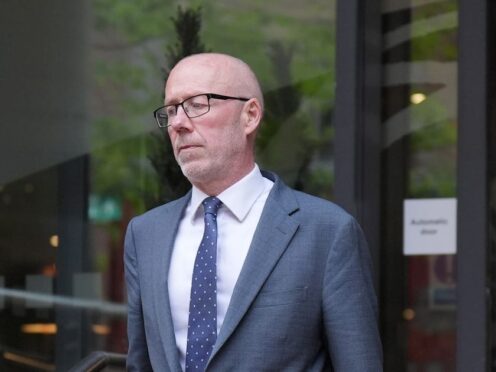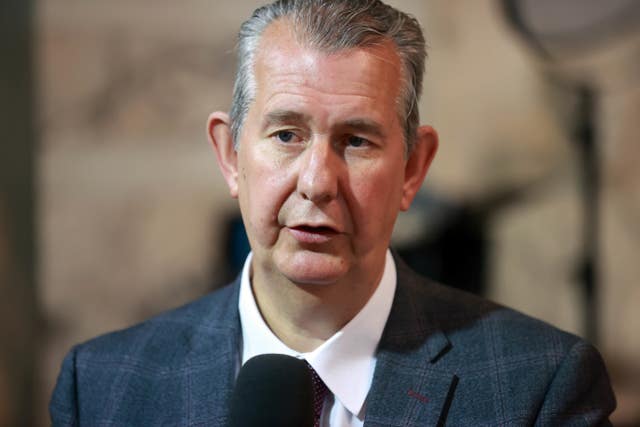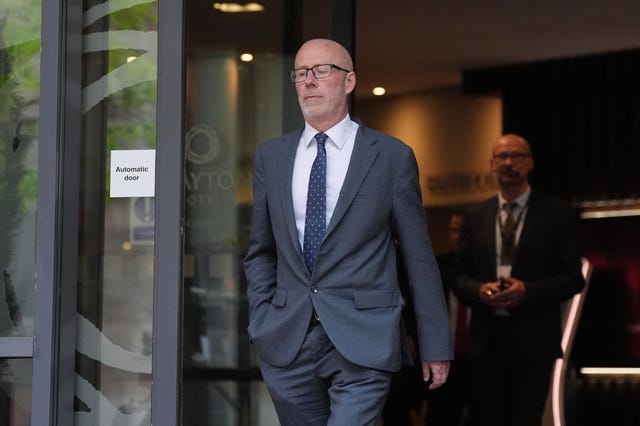
The triggering of cross-community votes by Stormont ministers over lockdown restrictions was “not helpful” in maintaining public confidence in measures to combat the Covid pandemic, a senior scientific adviser has said.
Professor Ian Young also told the UK Covid-19 Inquiry that he believed that hospital services were within days of being overrun by the rising numbers of infections during a second wave of the virus in the autumn of 2020.
Professor Young is the Chief Scientific Adviser (CSA) in the Department of Health and was one of the most high-profile figures during efforts by the devolved administration to tackle the pandemic.
Giving evidence to the inquiry, sitting in Belfast, Prof Young was questioned about a rise in Covid cases in Northern Ireland during the time in question.

He said: “By October 8 (2020) I think we had reached the point where there was a realistic danger of the healthcare system becoming overwhelmed if there was not a rapid intervention.”
The inquiry was then shown a handwritten note from former Agriculture Minister Edwin Poots from an Executive meeting on that date which read “CSA – looking for v damaging approach”.
Asked about this, Prof Young said: “I understood that some ministers were unhappy with the information they were receiving and there was certainly plenty of robust discussion, which I thought was entirely appropriate in terms of the science being questioned.
“Always, I think that I sought to provide advice on a wide range of options.”
Lead counsel for the inquiry Clair Dobbin KC said the Executive did not make any decisions about extending lockdown measures at that October meeting.
Prof Young said: “I think that following that meeting there were exchanges over the weekend where we emphasised the fact that we were very close to reaching the point where the hospital system could be overwhelmed.”
Ms Dobbin added: “There was some suggestion by the same minister (Mr Poots), and it was made in public, that transmission rates were higher in areas that were of a particular political background. Is that correct?”
Prof Young said: “From recollection, the minister suggested that transmission rates were higher in areas which would have been perceived as predominantly nationalist in terms of their background and make-up.”
He added: “I recall being asked about it in more than one media interview and saying it had never been an analysis or comparison that we had done, nor would I think it appropriate to do in terms of our response to the pandemic.”
The inquiry then heard about a series of Executive meetings in November 2020 where ministers struggled to agree on extensions to lockdown measures.
Prof Young said: “We were very concerned about hospital numbers at that time and in particular about much higher numbers in hospital in the post-Christmas period.”
Ms Dobbin said a recommendation from Health Minister Robin Swann for a two-week extension to lockdown measures was initially defeated.
Prof Young confirmed that the vote was taken on a cross-community basis by ministers.
At the time the DUP triggered the cross-community vote, effectively giving them a veto over the plan.
The cross-community vote can be deployed by any three ministers to require cross-community support on a particular matter, effectively giving a party with enough ministers in the power-sharing executive a veto.

Ms Dobbin said: “The idea that a public health measure should be voted on on a cross-community basis, was that a concern to you as a scientific adviser?”
Prof Young said: “I thought it was unfortunate in terms of public perception, particularly given the ongoing discussion of events at Executive meetings, I didn’t think it was helpful in terms of public confidence.”
Ms Dobbin said: “I wonder is it a little bit more than a perception of public confidence?”
Prof Young added: “I think it was unfortunate. I think it was not helpful in terms of public perception and confidence in terms of decision-making.”

Enjoy the convenience of having The Sunday Post delivered as a digital ePaper straight to your smartphone, tablet or computer.
Subscribe for only £5.49 a month and enjoy all the benefits of the printed paper as a digital replica.
Subscribe